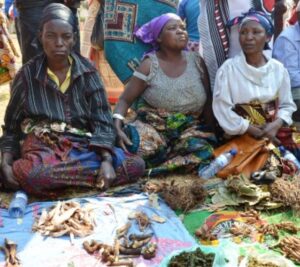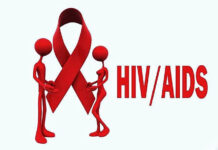In the heart of Nigeria’s diverse healthcare landscape lies a rich tapestry of traditional medicine, woven with centuries-old practices and cultural wisdom. As the nation strides forward in modern healthcare advancements, the influence of traditional remedies remains a steadfast pillar, shaping perceptions, accessibility, and outcomes. Embarking on a journey to explore this dynamic interplay unveils not just the efficacy of herbal concoctions and ancient therapies, but also the intricate fusion of tradition and innovation in Nigeria’s quest for comprehensive healthcare solutions.

This article aims to navigate the intricate nuances of traditional medicine’s impact on Nigeria’s healthcare ecosystem, offering readers a comprehensive understanding of:
1. The prevalence and significance of traditional healing practices amidst modern healthcare systems.
2. The efficacy and safety considerations surrounding traditional remedies.
3. The regulatory framework governing the integration of traditional medicine into mainstream healthcare.
4. Cultural perspectives shaping attitudes towards traditional healing.
5. The accessibility and affordability of traditional healing compared to conventional medical treatments.
6. Efforts to promote education and awareness about traditional healing practices.
7. The evolving role of traditional healers in the contemporary healthcare landscape.
By delving into these dimensions, readers will gain a nuanced appreciation of how traditional medicine continues to shape and enrich Nigeria’s healthcare journey, offering both challenges and opportunities for holistic healthcare delivery.
1) Usage Prevalence
Usage prevalence of traditional medicine in Nigeria is deeply ingrained in the fabric of daily life, with millions of people relying on traditional healers and remedies for their healthcare needs. Across the country, communities turn to traditional medicine for a variety of ailments, ranging from common illnesses to chronic conditions.
For instance, in rural areas where access to modern healthcare facilities may be limited, traditional healers serve as primary caregivers, offering herbal concoctions, spiritual rituals, and physical therapies to alleviate symptoms and restore health. These healers often hold esteemed positions within their communities, passing down knowledge and expertise through generations.
Even in urban centers, where modern healthcare is more readily available, the usage of traditional medicine persists. Many individuals, influenced by cultural beliefs or seeking alternative treatments, incorporate traditional remedies alongside conventional medical care. This dual approach reflects the dynamic healthcare landscape of Nigeria, where traditional and modern practices coexist and intersect.
Moreover, the prevalence of traditional medicine is not confined to individual health-seeking behaviors but also extends to institutional settings. Some hospitals and clinics offer integrative healthcare services that combine modern medical treatments with traditional healing modalities, catering to diverse patient preferences and needs.
Overall, the usage prevalence of traditional medicine in Nigeria underscores its enduring relevance and significance in the healthcare landscape, serving as evidence of the resilience of traditional healing practices amidst evolving healthcare systems.
2) Efficacy and safety
Assessing the efficacy and safety of traditional medicine in Nigeria is a multifaceted endeavor, influenced by diverse factors such as cultural beliefs, empirical evidence, and regulatory oversight.
Instances abound of traditional remedies demonstrating remarkable efficacy in managing various health conditions. For example, plants like bitter leaf (Vernonia amygdalina) and moringa (Moringa oleifera) are widely used for their purported medicinal properties, believed to treat ailments ranging from malaria to diabetes.
Additionally, traditional therapies such as massage, acupuncture, and bone-setting have been reported to alleviate pain and promote healing, drawing upon centuries-old practices passed down through generations.
However, alongside these anecdotes of success, concerns regarding the safety of certain traditional remedies persist. Without standardized manufacturing processes or rigorous quality control measures, there is a risk of contamination, adulteration, or improper dosing, which can lead to adverse reactions or toxicity. For instance, the indiscriminate use of herbal concoctions containing potentially toxic substances has been associated with liver and kidney damage in some cases.
Moreover, the efficacy of traditional medicine is often subject to debate due to the lack of robust scientific evidence supporting its claims. While some traditional remedies have been scientifically validated through clinical trials and pharmacological studies, many others remain anecdotal or based on traditional knowledge passed down orally.
Addressing these challenges requires a balanced approach that acknowledges both the potential benefits and risks of traditional medicine. Collaborative efforts between traditional healers, healthcare practitioners, researchers, and policymakers are essential to promote the safe and effective use of traditional remedies, leveraging indigenous knowledge while upholding standards of safety and quality assurance.
3) Regulatory framework
Navigating the regulatory framework surrounding traditional medicine in Nigeria is a complex endeavor shaped by a blend of cultural traditions, governmental policies, and international standards.
At the national level, the National Agency for Food and Drug Administration and Control (NAFDAC) plays a pivotal role in regulating traditional medicine products. NAFDAC oversees the registration, certification, and monitoring of traditional herbal medicines to ensure their safety, quality, and efficacy. Through stringent regulatory measures, NAFDAC aims to safeguard public health and promote consumer confidence in traditional remedies.
Additionally, the Traditional Medicine Department of the Federal Ministry of Health is tasked with developing policies, guidelines, and standards for the integration of traditional medicine into the national healthcare system. This department collaborates with traditional healers, researchers, and other stakeholders to streamline the regulation and practice of traditional medicine, fostering a harmonious coexistence with modern healthcare.
Furthermore, Nigeria is a signatory to the World Health Organization’s (WHO) Traditional Medicine Strategy, which advocates for the integration of traditional medicine into national healthcare systems while ensuring patient safety and quality of care. By aligning with international standards and best practices, Nigeria seeks to enhance the regulation and governance of traditional medicine by global norms.
Despite these regulatory efforts, challenges persist in effectively overseeing the vast landscape of traditional healing practices, particularly in rural and remote areas where formal regulation may be limited. Informal networks of traditional healers operate outside of official oversight, raising concerns about quality control, patient safety, and ethical standards.
Moving forward, ongoing efforts to strengthen the regulatory framework for traditional medicine in Nigeria must prioritize collaboration, capacity building, and community engagement. By fostering dialogue between regulators, traditional healers, healthcare professionals, and policymakers, Nigeria can navigate the complexities of traditional medicine regulation while harnessing its potential to complement and enhance modern healthcare delivery.

4) Cultural significance
Exploring the cultural significance of traditional medicine in Nigeria unveils a deep-rooted tapestry of beliefs, practices, and rituals that are intertwined with the fabric of society.
Across Nigeria’s diverse ethnic groups and communities, traditional healing practices are imbued with profound cultural significance, serving as more than just remedies for physical ailments but also as conduits for spiritual healing and social cohesion.
For example, among the Yoruba people of southwestern Nigeria, the practice of Ifa divination is not only a means of diagnosing illnesses but also a sacred tradition that connects individuals with their ancestors and spiritual guides. Similarly, among the Hausa-Fulani in northern Nigeria, the role of traditional healers known as “malams” or “herbalists” extends beyond herbal medicine to include spiritual rituals and prayers believed to ward off evil spirits and restore balance to the body.
Moreover, traditional healing ceremonies and rituals often serve as important cultural markers, symbolizing rites of passage, communal solidarity, and identity preservation. For instance, traditional childbirth practices, such as the “omugwo” ceremony among the Igbo people, involve the use of herbs, incantations, and rituals performed by elder women to ensure the health and well-being of the mother and newborn.
In addition to their practical healing functions, traditional medicine practitioners often hold esteemed positions within their communities, serving as custodians of indigenous knowledge and cultural heritage. The passing down of healing techniques and remedies from one generation to the next reinforces the continuity of cultural traditions and fosters a sense of collective identity and pride.
Understanding the cultural significance of traditional medicine in Nigeria goes beyond its biomedical efficacy to encompass its broader socio-cultural dimensions. By recognizing and respecting the diverse cultural contexts in which traditional healing practices thrive, Nigeria can harness the strengths of both traditional and modern healthcare systems to promote holistic well-being and health equity for all its citizens.
5) Accessibility and affordability
Examining the accessibility and affordability of traditional medicine in Nigeria sheds light on its pivotal role in meeting the healthcare needs of diverse populations, particularly in underserved and marginalized communities.
In many rural and remote areas where access to modern healthcare facilities is limited, traditional medicine serves as the primary source of healthcare services.
Traditional healers, often deeply embedded within their communities, provide accessible and affordable remedies for a wide range of ailments. For example, in villages scattered across the Niger Delta region, traditional healers known as “dibia” or “native doctors” offer herbal treatments, spiritual rituals, and counseling services to address common health issues such as malaria, infections, and musculoskeletal pain. The accessibility of these healers is enhanced by their proximity to the communities they serve, as well as their familiarity with local customs and languages.
Moreover, the affordability of traditional medicine is a significant factor driving its widespread use, particularly among low-income households with limited financial resources. Unlike modern healthcare services, which may involve costly consultations, diagnostic tests, and pharmaceuticals, traditional remedies are often derived from locally available plants, herbs, and natural substances, making them more economically accessible to marginalized populations. For instance, the use of medicinal plants such as neem (Azadirachta indica) and pawpaw (Carica papaya) for treating common ailments is not only culturally accepted but also a cost-effective alternative to conventional medications.
However, while traditional medicine offers benefits in terms of accessibility and affordability, disparities in quality, safety, and efficacy must be addressed to ensure equitable healthcare outcomes for all Nigerians. Standardizing practices, promoting evidence-based approaches, and integrating traditional medicine into formal healthcare systems can enhance its accessibility while safeguarding patient safety and well-being.
By leveraging the strengths of both traditional and modern healthcare systems, Nigeria can improve healthcare access and affordability for all its citizens, particularly those in underserved areas, ultimately advancing the goal of universal health coverage and sustainable development.

6) Education and awareness
Examining education and awareness surrounding traditional medicine in Nigeria reveals the critical role of knowledge dissemination and cultural understanding in promoting safe and effective healthcare practices.
Historically, traditional healing knowledge has been transmitted orally from one generation to the next, often within family lineages or apprenticeship arrangements. However, with the advent of formal education systems and modern healthcare paradigms, traditional healing practices have sometimes been marginalized or stigmatized, leading to a decline in traditional medicine knowledge among younger generations.
Efforts to promote education and awareness about traditional medicine are essential for preserving indigenous healing traditions and empowering communities to make informed healthcare decisions. For example, community-based initiatives, such as workshops, seminars, and health fairs, can provide platforms for traditional healers to share their knowledge and expertise with the wider population. These events not only foster dialogue between traditional healers and modern healthcare practitioners but also raise awareness about the cultural significance and therapeutic potential of traditional medicine.
Moreover, integrating traditional medicine education into formal healthcare curricula can bridge the gap between traditional and modern healthcare systems, equipping healthcare professionals with the knowledge and skills needed to collaborate effectively with traditional healers. By incorporating modules on traditional medicine into medical, nursing, and pharmacy programs, educational institutions can promote a more holistic approach to healthcare delivery that recognizes the value of indigenous healing practices.
In addition to formal education initiatives, media campaigns, public awareness campaigns, and community outreach programs can play crucial roles in dispelling myths, reducing stigma, and fostering a greater appreciation for traditional medicine. By highlighting success stories, sharing testimonials, and providing evidence-based information, these initiatives can empower individuals to make informed choices about their healthcare options, whether traditional, modern, or integrative.
Ultimately, education and awareness efforts can contribute to a more inclusive healthcare landscape in Nigeria, where traditional medicine is respected, integrated, and valued as a vital component of the nation’s healthcare heritage.
7) Traditional healer’s role
The role of traditional healers in Nigeria’s healthcare landscape is multifaceted, encompassing not only the provision of medical treatments but also spiritual guidance, community support, and cultural preservation.
In rural and remote areas where access to modern healthcare facilities is limited, traditional healers serve as primary caregivers, offering a wide range of healing modalities, including herbal remedies, physical therapies, and spiritual rituals. For instance, among the Igbo people of southeastern Nigeria, traditional healers known as “dibia” play central roles in diagnosing and treating illnesses using a combination of herbal medicines and spiritual interventions. These healers often hold esteemed positions within their communities, serving as trusted advisors and custodians of indigenous knowledge.
Beyond their therapeutic interventions, traditional healers also provide emotional support, counseling, and social cohesion within their communities. In times of crisis or uncertainty, traditional healers may be sought out for guidance, comfort, and reassurance, drawing upon their deep understanding of cultural norms, social dynamics, and interpersonal relationships.
Moreover, traditional healers play vital roles in preserving and transmitting cultural heritage from one generation to the next. Through apprenticeship programs, oral traditions, and sacred rituals, they pass down knowledge, wisdom, and healing techniques that have been honed over centuries. By maintaining cultural continuity and preserving indigenous healing practices, traditional healers contribute to the resilience and identity of Nigerian communities.
However, alongside their contributions, traditional healers also face challenges, including stigma, marginalization, and lack of recognition within formal healthcare systems. Efforts to bridge the gap between traditional and modern healthcare, promote mutual respect, and foster collaboration between traditional healers and biomedical practitioners are essential for harnessing the full potential of Nigeria’s healthcare landscape.
In conclusion, the role of traditional healers in Nigeria’s healthcare ecosystem is invaluable, encompassing healthcare provision, spiritual guidance, community support, and cultural preservation. Recognizing, respecting, and integrating traditional healing practices into the broader healthcare framework can enhance access, equity, and effectiveness in healthcare delivery for all Nigerians.
The dynamic interplay between traditional medicine and modern healthcare in Nigeria reflects a rich tapestry of cultural heritage, community resilience, and holistic healing. From the remote villages of the Niger Delta to the bustling streets of Lagos, traditional healers and remedies continue to play a pivotal role in meeting the diverse healthcare needs of the Nigerian population.
As Nigeria strides forward in its quest for universal health coverage and sustainable development, it is imperative to recognize the intrinsic value of traditional medicine as a source of healing, wisdom, and cultural identity. By fostering dialogue, collaboration, and mutual respect between traditional healers, healthcare professionals, policymakers, and communities, Nigeria can harness the strengths of both traditional and modern healthcare systems to achieve better health outcomes for all its citizens.
Moving forward, it is essential to prioritize efforts to promote education, raise awareness, and strengthen regulatory frameworks that support the safe and effective integration of traditional medicine into the national healthcare system. By doing so, Nigeria can honor its rich healthcare heritage while embracing innovation and progress, paving the way for a healthier, more resilient future for generations to come.




